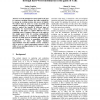Free Online Productivity Tools
i2Speak
i2Symbol
i2OCR
iTex2Img
iWeb2Print
iWeb2Shot
i2Type
iPdf2Split
iPdf2Merge
i2Bopomofo
i2Arabic
i2Style
i2Image
i2PDF
iLatex2Rtf
Sci2ools
134
click to vote
CIG
2005
IEEE
2005
IEEE
Forcing Neurocontrollers to Exploit Sensory Symmetry Through Hard-wired Modularity in the Game of Cellz
Several attempts have been made in the past to construct encoding schemes that allow modularity to emerge in evolving systems, but success is limited. We believe that in order to create successful and scalable encodings for emerging modularity, we first need to explore the benefits of different types of modularity by hard-wiring these into evolvable systems. In this paper we explore different ways of exploiting sensory symmetry inherent in the agent in the simple game Cellz by evolving symmetrically identical modules. It is concluded that significant increases in both speed of evolution and final fitness can be achieved relative to monolithic controllers. Furthermore, we show that simple function approximation task that exhibits sensory symmetry can be used as a quick approximate measure of the utility of an encoding scheme for the more complex game-playing task. 1 Background The current interest in exploring and exploiting modularity in evolutionary robotics can be understood in sever...
| Added | 24 Jun 2010 |
| Updated | 24 Jun 2010 |
| Type | Conference |
| Year | 2005 |
| Where | CIG |
| Authors | Julian Togelius, Simon M. Lucas |
Comments (0)

